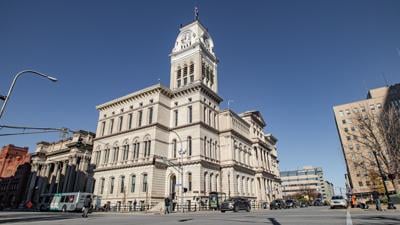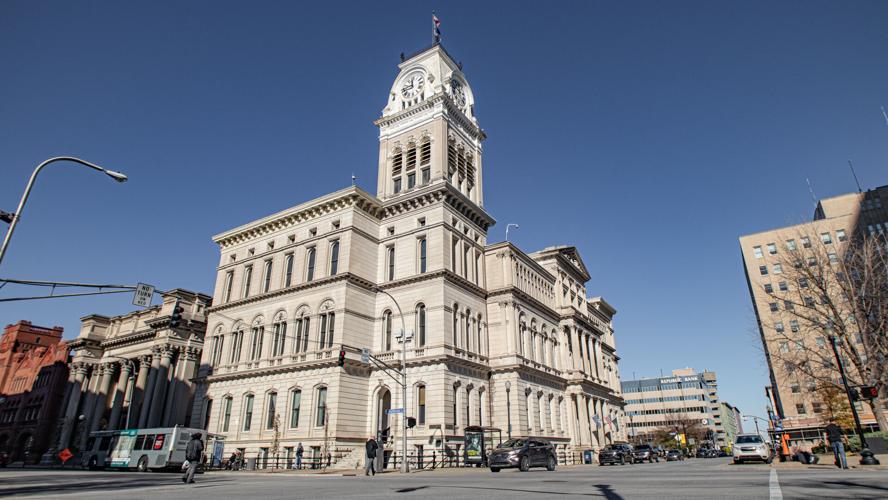LOUISVILLE, Ky. (WDRB) – Elections for Louisville’s mayor and Metro Council would be nonpartisan under a recommendation approved Thursday by a group of state, local and other civic leaders studying Louisville Metro government.
The Louisville Metro Comprehensive Review Commission voted 11 to 2, with two members not voting, to urge the Kentucky General Assembly to take action when it meets starting in January.
“One thing I’ve seen is that national politics have become more divisive,” filtering down to local levels, said Earl Jones, the commission’s co-chair. “It’s certainly affected us here in this community.”
“I think that there are benefits to having some decisions being taken without regard to party,” Jones said.
The recommendation was one of at least eight set to be considered at the commission’s Thursday meeting. The Republican-controlled legislature created the body last year to look at how to improve services and evaluate the dynamic between merged city-county government and suburban cities in Jefferson County.
Commission member Bonnie Jung, the mayor of Douglass Hills and the president of the Jefferson County League of Cities, put forth the proposal, arguing that U.S. cities like Nashville and Columbus, Ohio, already have nonpartisan elections.
Commissioner Gerald Neal, a Democratic state senator from Louisville, said he didn’t have enough information to make a decision, as did state Rep. Pamela Stevenson, a Democrat who is running for attorney general in the November election.
Without enough data on the advantages and disadvantages of partisan races, Stevenson said the commission was plunging “headlong into something that we know nothing about.”
But another commission member, Republican state Sen. Julie Raque Adams of Louisville, backed the recommendation. She contrasted it with a bill introduced this year by GOP Senate Majority Floor Leader Damon Thayer, who unsuccessfully pushed to make school board and local races partisan.
Raque Adams said the response from her constituents to that bill was: “Please do not turn these things partisan.”
Democratic Louisville Metro Council member Cindi Fowler asked if the state legislature would follow suit and make their races nonpartisan. “If it’s good for us it should be good for the whole state,” she said.
Raque Adams said there’s no precedent for a state legislature to be nonpartisan, but there is for cities. Just four cities in Kentucky don’t have partisan races, she said.
The review commission already has approved recommendations that include urging state lawmakers to put a constitutional amendment before voters that could pave the way for local governments to add their own sales taxes.
The panel also wants the General Assembly to revise the longstanding calculation – called the “formula of the fifths” -- that divvies up gas tax revenue for city, county and rural roads. That formula now leans heavily toward rural areas.
It took up additional ideas Thursday, including one that would suggest that the state legislature pass a bill setting geographic, political and other diversity requirements for board and commissions in Louisville and other local governments in Kentucky.
State Representative Jason Nemes (R-Louisville) says areas outside the Watterson are under-represented.
"What we want to do here, is to make sure that we have legitimate political and geographic diversity when we're making appointments to boards," Nemes said.
As some were pushing back against the recommendation, Nemes questioned why there was opposition.
"We've got boards that don't have anybody outside the Watterson on them, we're trying to get them there, and there's a fight," Nemes said.
State Senator Gerald Neal (R-Louisville) directly responded to Nemes, saying he's had an issue with the process of the commission from the beginning. He says the timeline feels rushed, and can sow seeds of doubt.
"That doesn't bring the community together, and then we'll be dealing with this again. We'll be dealing with this all kinds of ways," Neal said. "The only thing I'm saying is that I have a question about the process."
Louisville’s current ordinance currently encourages such diversity; the commission wants state lawmakers to mandate it, except when not enough people volunteer to serve.
After a spirited debate, the measure passed 12-2, with one member not voting.
The GOP-led legislature established the review commission in House Bill 314 during the 2022 General Assembly. Among other things, the bill also limits Louisville's mayor to two terms and lets voters in unincorporated areas in Jefferson County outside the Urban Services District form new cities of at least 6,000 people if 66 percent of those living in the proposed city limits petition the Metro Council.
The council must approve the new cities if they meet the bill’s thresholds. That could happen only after July 15, 2024.
Jefferson County has about 80 independent cities. The merger of the county and Louisville governments nearly two decades ago allowed those to remain but prevented new cities from forming.
Critics equated the bill to a “war on Louisville” that could unravel key parts of the merger voters approved in 2000. Proponents argued that letting citizens create new small cities was a matter of fairness, especially outside the dividing line of the Urban Services District.
That district – the boundary of the old City of Louisville – levies higher taxes but gives residents access to services like trash collection that aren’t available outside it.
This story will be updated.
Copyright 2023 WDRB Media. All rights reserved.














